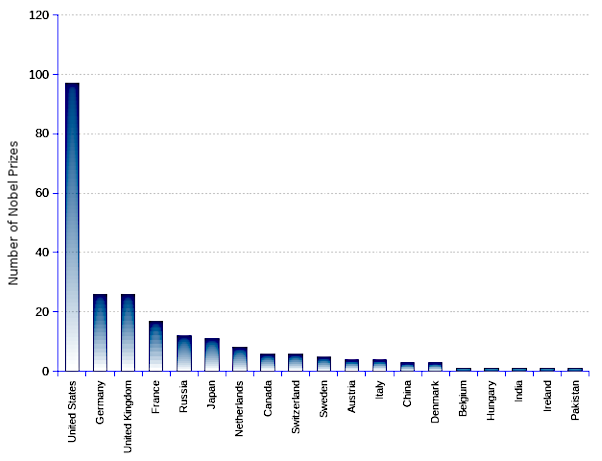areppim: information, pure and simple

The laureates of Nobel prize for physics form an exclusive 19-nation club, practically restricted to North Americans and Europeans, with respectively 44% and 49% membership, and only a minor presence from other continents reaching 7%.
In spite of their growing economic and political power, Asian big powers, of which China, India and Pakistan have already joined the Nobel club, do not yet challenge the western supremacy in the domain. Knowledge diffusion is a nice thing to advocate, but with respect to some arcane physics knowledge, owners try to keep doors securely fastened.
![]() Take a look at the complete list of Nobel prizes for physics
Take a look at the complete list of Nobel prizes for physics
| Nation ¹ | Number of awards | Percent |
|---|---|---|
| Austria | 4 | 1.7% |
| Belgium | 1 | 0.4% |
| Canada | 6 | 2.6% |
| China | 3 | 1.3% |
| Denmark | 3 | 1.3% |
| France | 17 | 7.2% |
| Germany | 26 | 11.1% |
| Hungary | 1 | 0.4% |
| India | 1 | 0.4% |
| Ireland | 1 | 0.4% |
| Italy | 4 | 1.7% |
| Japan | 11 | 4.7% |
| Netherlands | 8 | 3.4% |
| Pakistan | 1 | 0.4% |
| Russia | 5 | 2.1% |
| Soviet Union | 7 | 3.0% |
| Sweden | 5 | 2.1% |
| Switzerland | 6 | 2.6% |
| United Kingdom | 27 | 11.5% |
| United States | 98 | 41.7% |
| Total | 235 | 100.0% |
| ¹ Double nationals are counted twice, once for each nationality. Former Soviet Union appears under Russia. | ||
Sources: Nobelprize